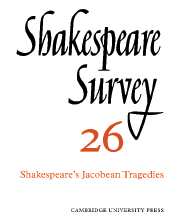Book contents
- Frontmatter
- Studies in Shakespearian and Other Jacobean Tragedy, 1918–1972: A Retrospect
- ‘Form and Cause Conjoin’d’: ‘Hamlet’ and Shakespeare’s Workshop
- The Art of Cruelty: Hamlet and Vindice
- From Tragedy to Tragi-Comedy: ‘King Lear’ as Prologue
- Jacobean Tragedy and the Mannerist Style
- ‘King Lear’ and Doomsday
- Macbeth on Horseback
- Shakespeare’s Misanthrope
- ‘Antony and Cleopatra’ and ‘Coriolanus’, Shakespeare’s Heroic Tragedies: A Jacobean Adjustment
- Shakespeare’s Venus and Adonis Sonnets
- Orlando: Athlete of Virtue
- The Unfolding of ‘Measure for Measure’
- Shakespeare and the Eye
- No Rome of Safety: The Royal Shakespeare Season 1972 Reviewed
- The Year's Contributions to Shakespearian Study 1 Critical Studies
- 2 Shakespeare’s Life, Times, and Stage
- 3 Textual Studies
- Index
- Plate section
Jacobean Tragedy and the Mannerist Style
Published online by Cambridge University Press: 28 March 2007
- Frontmatter
- Studies in Shakespearian and Other Jacobean Tragedy, 1918–1972: A Retrospect
- ‘Form and Cause Conjoin’d’: ‘Hamlet’ and Shakespeare’s Workshop
- The Art of Cruelty: Hamlet and Vindice
- From Tragedy to Tragi-Comedy: ‘King Lear’ as Prologue
- Jacobean Tragedy and the Mannerist Style
- ‘King Lear’ and Doomsday
- Macbeth on Horseback
- Shakespeare’s Misanthrope
- ‘Antony and Cleopatra’ and ‘Coriolanus’, Shakespeare’s Heroic Tragedies: A Jacobean Adjustment
- Shakespeare’s Venus and Adonis Sonnets
- Orlando: Athlete of Virtue
- The Unfolding of ‘Measure for Measure’
- Shakespeare and the Eye
- No Rome of Safety: The Royal Shakespeare Season 1972 Reviewed
- The Year's Contributions to Shakespearian Study 1 Critical Studies
- 2 Shakespeare’s Life, Times, and Stage
- 3 Textual Studies
- Index
- Plate section
Summary
The imaginative vision that produced Shakespeare’s Jacobean tragedies was conditioned by that crisis of the Renaissance – that counter-Renaissance, as it is sometimes termed – brought on by those innovations in science and religion, political and moral philosophy that are associated with the names of Copernicus and Luther, Machiavelli and Montaigne. The effects of these have been often described. They issue in the recognition that truth is not absolute and completely objective but relative, that morality has a double standard (one for rulers, the other for the ruled), that the intellect is of no avail in scrutinizing the wisdom of God, that the earth is not the centre of the universe. It would be odd if so thorough-going a revolution in man’s conception of himself, his world, and his relation to deity – all accomplished within the limits of a single century – had not left its impact on the art of the sixteenth and early seventeenth centuries and of course it has done so, both on the art of literature, and on the arts of painting, architecture and sculpture.
In attempting to draw some analogies between the anti-classical movement in sixteenth- century painting and Jacobean tragedy, my purpose is to examine the drama of Shakespeare and his contemporary playwrights in the context of a post-Renaissance movement in the arts which by the beginning of the seventeenth century had spread across all of Europe, and to try and isolate some of the features which Jacobean drama shares with the style of continental mannerism.
- Type
- Chapter
- Information
- Shakespeare Survey , pp. 49 - 68Publisher: Cambridge University PressPrint publication year: 1973
- 5
- Cited by



